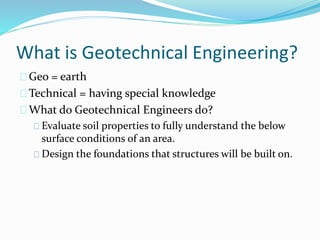Some Of Geotheta
Our Geotheta PDFs
Table of ContentsWhat Does Geotheta Do?The Ultimate Guide To GeothetaWhat Does Geotheta Mean?Geotheta Can Be Fun For EveryoneGeotheta Fundamentals Explained

They perform site investigations, accumulate samples, do lab tests, and examine information to review the suitability of the ground for building tasks - Geo Tech Engineer. Based upon their searchings for, geotechnical designers supply referrals for foundation design, slope stability, maintaining structures, and mitigation of geotechnical hazards. They collaborate with various other professionals, such as designers, architectural engineers, and building and construction groups, to guarantee that geotechnical considerations are integrated into the overall task design and implementation
By assessing the habits and homes of dirt and rock, they can determine potential geotechnical risks such as landslides, dirt negotiation, or incline instability. Their knowledge helps avoid failures or accidents that could jeopardize lives and property. Below are some detailed tasks and responsibilities of a geotechnical engineer: Website Investigation: Geotechnical engineers conduct site investigations to collect data on subsurface problems.
They interpret the information to recognize the residential properties and habits of the soil and rock, including their strength, permeability, compaction qualities, and groundwater conditions. Geotechnical Evaluation and Design: Geotechnical engineers examine the information collected throughout site examinations to analyze the stability and viability of the site for building projects. They perform geotechnical calculations and modeling to assess variables such as bearing capacity, negotiation, slope stability, lateral earth stress, and groundwater circulation.
Get This Report about Geotheta
Structure Layout: Geotechnical engineers play a crucial duty in developing structures that can securely sustain the designated structure. They analyze the soil conditions and lots needs to establish the proper foundation type, such as shallow foundations (e.g., footings), deep foundations (e.g (https://geotheta.bandcamp.com/album/geotheta)., heaps), or specialized techniques like dirt renovation. They consider factors such as negotiation restrictions, bearing ability, and soil-structure interaction to develop optimal foundation designs
They examine building and construction plans, screen site tasks, and carry out area evaluations to verify that the layout suggestions are followed. If unexpected geotechnical problems arise, they examine the situation and provide recommendations for remediation or changes to the layout. Danger Assessment and Mitigation: Geotechnical engineers analyze geotechnical threats and dangers related to the task site, such as landslides, liquefaction, or soil disintegration.

Partnership and Communication: Geotechnical designers work very closely with various other professionals involved in a task, such as designers, structural designers, and building and construction groups. Effective interaction and collaboration are important to integrate geotechnical considerations right into the general task style and building and construction process. Geotechnical designers supply technical know-how, answer inquiries, and make certain that geotechnical demands are met.
All about Geotheta
Here are some types of geotechnical designers: Foundation Designer: Structure designers specialize in developing and assessing structures for structures. They examine the dirt conditions, load requirements, and site features to figure out one of the most suitable foundation type and layout, such as superficial foundations, deep foundations, or specialized methods like pile foundations.
They assess the aspects affecting incline security, such as dirt properties, groundwater problems, and slope geometry, and develop approaches to avoid slope failures and reduce dangers. Quake Designer: Quake designers concentrate on analyzing and developing structures to stand up to seismic forces. They evaluate the seismic risk of a site, review soil liquefaction possibility, and establish seismic style requirements to make certain the safety and security and strength of frameworks throughout quakes.
They execute area testing, collect samples, and evaluate the collected data to characterize the soil properties, geologic formations, and groundwater conditions at a website. Geotechnical Instrumentation Designer: Geotechnical instrumentation engineers concentrate on surveillance and measuring the behavior of dirt, rock, and structures. They mount and keep instrumentation systems that monitor factors such as dirt settlement, groundwater levels, slope movements, and architectural variations to evaluate performance and provide very early cautions of prospective concerns.
The smart Trick of Geotheta That Nobody is Talking About
They perform tests such as triaxial tests, loan consolidation tests, direct shear examinations, and leaks in the structure tests to collect information for geotechnical analysis and layout. Geosynthetics Engineer: Geosynthetics designers concentrate on the design and application of geosynthetic products, such as geotextiles, geogrids, and geomembranes. They utilize these materials to enhance dirt security, enhance inclines, give water drainage solutions, and control disintegration.
They often tend to be investigatory people, which means they're intellectual, introspective, and analytical. They are curious, systematic, sensible, analytical, and sensible. Some of them are also social, suggesting they're kind, charitable, cooperative, patient, caring, handy, empathetic, sensible, and pleasant - Engineer of Record.
In the office atmosphere, geotechnical engineers use specialized software program tools to execute computations, produce designs, and analyze data. They prepare reports, evaluation job requirements, interact with clients and team participants, and coordinate task activities. The workplace setting offers a conducive atmosphere for research, evaluation, and collaboration with various click here to read other professionals associated with the project.
Unknown Facts About Geotheta
They regularly check out job websites to conduct site examinations, assess geotechnical problems, and gather information for analysis. These brows through involve traveling to various places, occasionally in remote or challenging surfaces. Geotechnical engineers might execute soil sampling, conduct tests, and monitor construction activities to make sure that the geotechnical aspects of the task are being implemented properly.
Geotechnical engineers likewise operate in specialized geotechnical labs. In these facilities, they perform experiments, carry out examinations on soil and rock examples, and assess the design buildings of the materials. Geotechnical research laboratory engineers function thoroughly in these environments, dealing with testing devices, operating tools, and taping data. They work together with other laboratory team to make certain precise and trusted screening results.